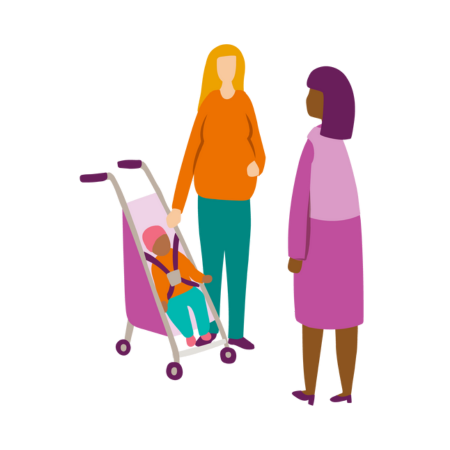Mental health problems during and after pregnancy are common. Some women have a previous mental health condition that can be exacerbated by pregnancy or having a baby. For others, they may experience a mental health problem for the very first time.
Whatever your situation, please remember that health professionals such as GPs, midwives, health visitors and mental health services are available to help you. Please don’t delay calling them if you are concerned about symptoms.
Our mental health and wellbeing tips may be useful and a good place to start if you notice you are feeling anxious or have a low mood.
How do I know what's "normal"? from Best Beginnings
There are different perinatal mental health problems with differing symptoms, and you or a loved one may not even realise that what you’re experiencing could be an illness. To help you spot signs that you or a loved one may need help, please consider the following questions:
1. Do you/they have new feelings and thoughts which you/they have never had before, and which make you/them disturbed or anxious?
2. Are you/they experiencing thoughts of suicide or harming yourself/themselves in violent ways?
3. Are you/they thinking they are a bad mum, as though you/they can’t cope, or feeling disconnected from the baby?
4. Do you feel you/they are getting worse?
If you or a loved one answer(s) ‘Yes’ to any of the above, please contact one of the support services below and get the professional help you need.
If you are concerned about your mental health, or the mental health of someone you know, it is important to either:

There are lots of organisations that offer mental health support to new and expectant parents.
You can refer yourself directly to free NHS therapy/counselling services in England or be referred through your GP in Wales, Scotland and Northern Ireland. In England, these services will prioritise women in pregnancy and postnatally.
There is also a directory of private counsellors working online or offering telephone counselling.
How to help others with mental health problems.
If you are taking medication for a mental health problem:
You know yourself better than anyone else. So if you know of anything that positively helps you manage or ease anxiety or low moods, try to make use of that.
If you have tried things that usually help and it is making little difference, or if your mood has worsened considerably, it is important to speak out.
The really good news is that we know how to treat mental health conditions during pregnancy or after birth. It is important to speak out as early as possible if you or your loved one have any symptoms that concern you, and it’s best to get treated early.
You or others that care for you may be concerned about speaking out, but there are specialist perinatal mental health teams in parts of the UK who are uniquely trained to support a mother’s recovery from perinatal mental health problems, with her baby.
Please remember that speaking out is a sign of strength and a way of looking after yourself, which in turn will help take care of your baby.


Find a variety of support options including in-person, online or over the phone.

MMHA member Netmums has a postcode search to help you find help close to home.